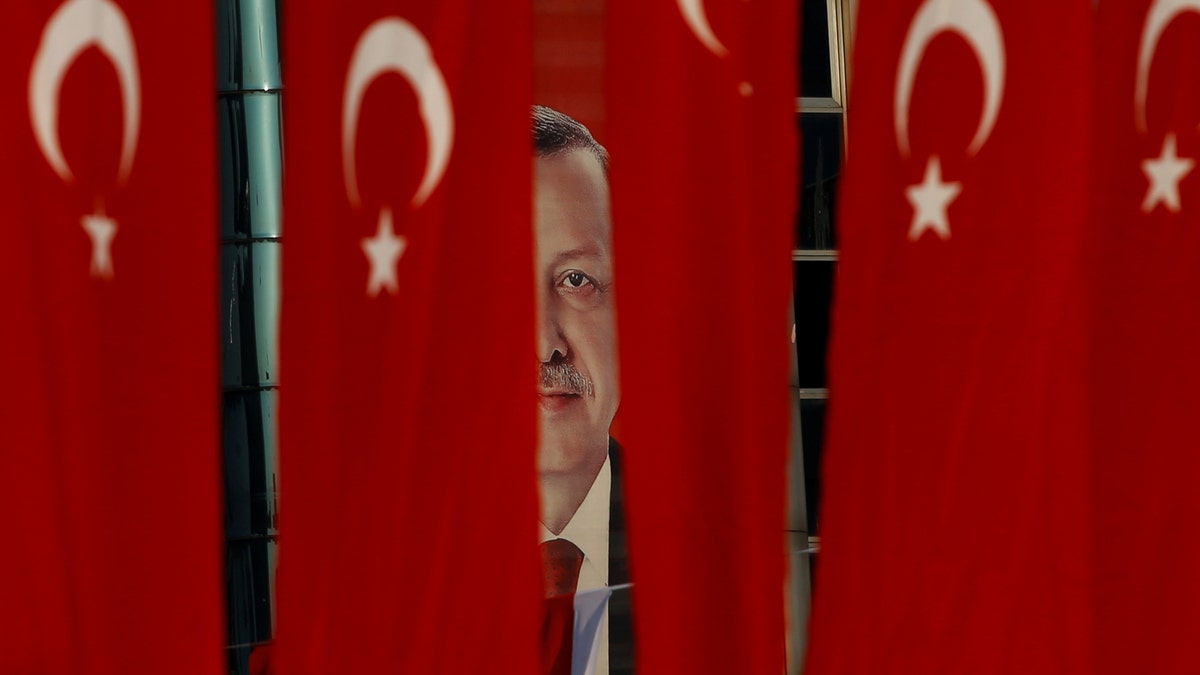
File photo - A picture of Turkish President Tayyip Erdogan is seen through Turkish national flags ahead of the constitutional referendum in Istanbul, Turkey, April 14, 2017. (REUTERS/Alkis Konstantinidis)
The ongoing legal conflict surrounding the Turkish government’s seizure of dozens of properties from the Syriac Orthodox Church has left the religious minority fearing for their survival in the land where it all began.
Authorities recently appropriated hundreds of thousands of square meters of land – including at least two 1,500-year-old working monasteries – on the premise that their ownership deeds had lapsed. An appeal against the confiscation by the Mor Gabriel, a 5th-century monastery and one of the oldest still functioning in the world, was dismissed in May by a government commission tasked with liquidating the assets.
“Our churches and monasteries are what root Syriacs in these lands; our existence relies on them,” Kyriakos Ergun, the chairman of the Mor Gabriel Monastery Foundation, told Middle East news website Al-Monitor. “While the country should be protecting this heritage, we instead see our culture is at risk.”
For years, the titles to the properties had been indexed in Turkey's national land registry as belonging to the villages inhabited by Syriacs. But in 2012, the greater municipality of the southeastern city of Mardin was established and the Syriacs' legal status – as well as their capacity to own property – was said to have dissipated.
As a result of the change, numerous monasteries and churches — as well as graveyards — have subsequently been given over to the state Treasury and then to the Department of Religious Affairs (Diyanet), a prominent state institution which presides over Muslims religious facilities.
The land tussle has many within the Syriac community, who often referred to as Assyrians, deeply concerned about their future in the place in which their ancestors have resided from as far back as their arrival from ancient Mesopotamia in 3500 B.C.
CHRISTIAN DIASPORA FEAR THEIR RELIGION WON'T SURVIVE IN ITS BIRTHPLACE
TURKISH OPPOSITION LEADER ENDS 25-DAY MARCH, RALLIES BACKERS
Leaders of several Assyrian organizations in the U.S and Europe have issued statements this week condemning Turkey’s seizure of Assyrian religious properties. A joint statement from the heads of the three most prominent organizations — Assyrian Universal Alliance USA, American Mesopotamian Organization USA and Restore Nineveh Now Foundation USA — requested that the U.S government, along with the United Nations and international human rights groups, demand that Turkey “stop this policy of religious and ethnic intolerance and immediately return the monasteries and churches to their rightful owners.”
The Syriacs, deemed the oldest indigenous minority of Turkey, were once a large ethnic group in the Ottoman Empire but their numbers dwindled as a result of alleged mass murder and deportation at the hands of the Young Turk government and Kurdish tribes during the “Seyfo Genocide” from 1914 to 1920.
Death toll estimates have varied, but it is believed that 150,000 to 300,000 perished.
However, according to news and information site Catholic Culture, the Turkish government has not yet moved ahead with the property seizures and officials have declared that the properties will not be confiscated if the Syriac Orthodox Church can present and register certifiable evidence of ownership.
According to the 2017 report by the U.S. Commission on International Religious Freedom (USIRF) while the Turkish government has “increasingly restricted a broad range of human rights, especially in the aftermath of the failed July 2016 coup d’état attempt, it has nevertheless taken some positive steps to improve religious freedom conditions in Turkey.”
The report indicates that the government has returned properties expropriated from religious minority communities and provided dual citizenship to Greek Orthodox Metropolitans so they can “participate in their church’s Holy Synod,” but notes that all religious groups are subject to state controls “limiting their rights to maintain places of worship, train clergy, and offer religious education.”




















